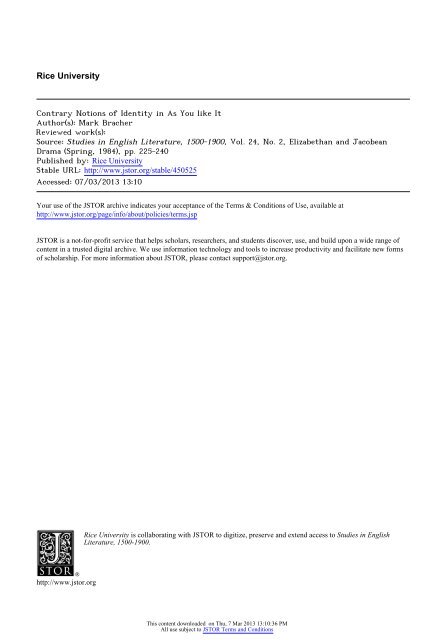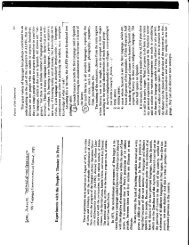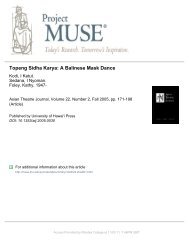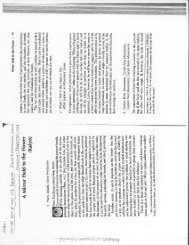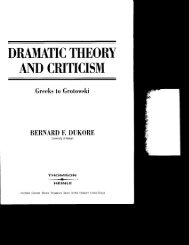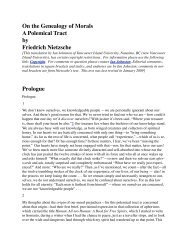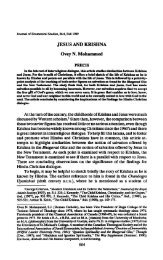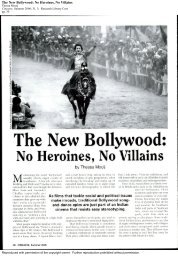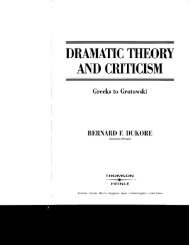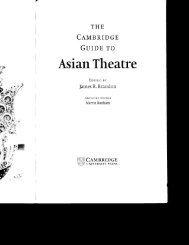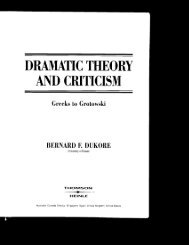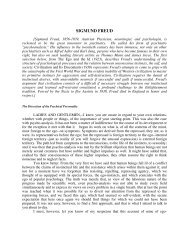Contrary Notions of Identity in As You like It - Yavanika
Contrary Notions of Identity in As You like It - Yavanika
Contrary Notions of Identity in As You like It - Yavanika
You also want an ePaper? Increase the reach of your titles
YUMPU automatically turns print PDFs into web optimized ePapers that Google loves.
Rice University<br />
<strong>Contrary</strong> <strong>Notions</strong> <strong>of</strong> <strong>Identity</strong> <strong>in</strong> <strong>As</strong> <strong>You</strong> <strong>like</strong> <strong>It</strong><br />
Author(s): Mark Bracher<br />
Reviewed work(s):<br />
Source: Studies <strong>in</strong> English Literature, 1500-1900, Vol. 24, No. 2, Elizabethan and Jacobean<br />
Drama (Spr<strong>in</strong>g, 1984), pp. 225-240<br />
Published by: Rice University<br />
Stable URL: http://www.jstor.org/stable/450525 .<br />
Accessed: 07/03/2013 13:10<br />
<strong>You</strong>r use <strong>of</strong> the JSTOR archive <strong>in</strong>dicates your acceptance <strong>of</strong> the Terms & Conditions <strong>of</strong> Use, available at .<br />
http://www.jstor.org/page/<strong>in</strong>fo/about/policies/terms.jsp<br />
.<br />
JSTOR is a not-for-pr<strong>of</strong>it service that helps scholars, researchers, and students discover, use, and build upon a wide range <strong>of</strong><br />
content <strong>in</strong> a trusted digital archive. We use <strong>in</strong>formation technology and tools to <strong>in</strong>crease productivity and facilitate new forms<br />
<strong>of</strong> scholarship. For more <strong>in</strong>formation about JSTOR, please contact support@jstor.org.<br />
.<br />
Rice University is collaborat<strong>in</strong>g with JSTOR to digitize, preserve and extend access to Studies <strong>in</strong> English<br />
Literature, 1500-1900.<br />
http://www.jstor.org<br />
This content downloaded on Thu, 7 Mar 2013 13:10:36 PM<br />
All use subject to JSTOR Terms and Conditions
SEL 24 (1984)<br />
ISSN 0039-3657<br />
<strong>Contrary</strong> <strong>Notions</strong> <strong>of</strong> <strong>Identity</strong> <strong>in</strong><br />
<strong>As</strong> <strong>You</strong> Like <strong>It</strong><br />
MARK BRACHER<br />
In her chapter on comedy <strong>in</strong> Feel<strong>in</strong>g and Form, Susanne Langer<br />
observes that comedy "sets up <strong>in</strong> the audience a sense <strong>of</strong> general exhilaration,<br />
because it presents the very image <strong>of</strong> 'liv<strong>in</strong>gness.'' This<br />
"immediate sense <strong>of</strong> life" which is "the essence <strong>of</strong> comedy"2 derives<br />
from the essential comic action, which, "whatever the story may be,<br />
. . . takes the form <strong>of</strong> a temporary triumph over the surround<strong>in</strong>g<br />
world."3 The experience <strong>of</strong> comedy is thus an experience "<strong>of</strong> human<br />
vitality hold<strong>in</strong>g its own <strong>in</strong> the world,"4 an experience <strong>of</strong>"organic unity,<br />
growth, and self-preservation."5 Life can triumph over the otherness<br />
<strong>of</strong> the world, however, <strong>in</strong> basically two ways, as Langer herself notes<br />
<strong>in</strong> pass<strong>in</strong>g:6 it can either negate this obstacle <strong>of</strong> otherness, exclud<strong>in</strong>g it<br />
from the world <strong>of</strong> the organism, or it can accommodate itself to this<br />
otherness, chang<strong>in</strong>g its own identity so as to <strong>in</strong>clude the other as other.<br />
Now, if comic action consists <strong>in</strong> a triumph <strong>of</strong> life over the world, and<br />
if this triumph <strong>of</strong> life can occur <strong>in</strong> two fundamentally different ways,<br />
we might expect that there would be two fundamentally different<br />
types <strong>of</strong> comedy correspond<strong>in</strong>g to the two modes <strong>of</strong> triumph.7 Such is<br />
<strong>in</strong> fact the case, as Northrop Frye has observed. Not<strong>in</strong>g <strong>in</strong> his Anatomy<br />
<strong>of</strong> Criticism that "comedy blends <strong>in</strong>to irony and satire at one end and<br />
Mark Bracher teachers English at Iowa State University. His book, Be<strong>in</strong>g Form'd:<br />
Th<strong>in</strong>k<strong>in</strong>g Through Blake's Milton (Station Hill Press, 1984), elaborates on many <strong>of</strong> the<br />
issues concern<strong>in</strong>g identity that are discussed <strong>in</strong> the present article.<br />
'Susanne K. Langer, Feel<strong>in</strong>g and Form: A Theory <strong>of</strong> Art (New York: Charles Scribner's<br />
Sons, 1953), p. 348.<br />
Ibid., p. 331.<br />
Ibid., p. 348.<br />
'Ibid., p. 331.<br />
'Ibid., p. 350.<br />
Ibid. p. 328.<br />
7Langer notes that this triumph can occur <strong>in</strong> various different ways-"by wit,<br />
luck, personal power, or even humorous, or ironical, or philosophical acceptance <strong>of</strong><br />
mischance" (p. 331), but she does not connect these different modes <strong>of</strong> triumph <strong>in</strong><br />
comedy with the two basic modes by which life itself triumphs.<br />
This content downloaded on Thu, 7 Mar 2013 13:10:36 PM<br />
All use subject to JSTOR Terms and Conditions
226<br />
IDENTITY IN AS YOU LIKE I T<br />
<strong>in</strong>to romance at the other,"8 Frye declares that "there are two ways <strong>of</strong><br />
develop<strong>in</strong>g the form <strong>of</strong> comedy: one is to throw the ma<strong>in</strong> emphasis on<br />
the block<strong>in</strong>g characters; the other is to throw it forward on the scenes<br />
<strong>of</strong> discovery and reconciliation. One is the general tendency <strong>of</strong> comic<br />
irony, satire, realism, and studies <strong>of</strong> manners; the other is the tendency<br />
<strong>of</strong> Shakespearean and other types <strong>of</strong> romantic comedy."9 We can<br />
identify ironic or satiric comedy, which emphasizes the block<strong>in</strong>g<br />
agent, with triumph through exclusion; and we can detect a similar<br />
k<strong>in</strong>ship between Shakespearean or romantic comedy and fulfillment<br />
through <strong>in</strong>clusion <strong>of</strong> otherness. For while the denouement <strong>of</strong> satiric<br />
comedy consists <strong>in</strong> the exclusion, through defeat (and <strong>in</strong> the purest<br />
form <strong>of</strong> this comedy, through expulsion as well) <strong>of</strong> the block<strong>in</strong>g agent,<br />
the denouement <strong>of</strong> Shakespeare's romantic comedy tends more<br />
toward the <strong>in</strong>clusion <strong>of</strong> this agent.<br />
In thus portray<strong>in</strong>g fulfillment <strong>in</strong> such fundamentally different<br />
ways, these two basic modes <strong>of</strong> comedy embody two fundamentally<br />
different perspectives on the nature <strong>of</strong> life itself: while satiric comedy<br />
focuses on life or the self as exclusive <strong>of</strong> otherness, Shakespearean<br />
comedy emphasizes that one's be<strong>in</strong>g is <strong>in</strong>clusive <strong>of</strong> otherness. The<br />
former evokes the "immediate sense <strong>of</strong> life" through opposition to and<br />
the defeat <strong>of</strong> otherness, while the latter produces this "sense <strong>of</strong> general<br />
exhilaration" through relation to and acceptance <strong>of</strong> otherness.<br />
But <strong>in</strong> thus evok<strong>in</strong>g different experiences <strong>of</strong> life itself, these two<br />
types <strong>of</strong> comedy, one could argue, may well predispose their audiences<br />
to two fundamentally different strategies <strong>of</strong> existence: for if we<br />
are made to apprehend the self as primarily exclusive, we will be more<br />
<strong>like</strong>ly to seek fulfillment by be<strong>in</strong>g exclusive, whereas if we are made to<br />
grasp the self as for the most part <strong>in</strong>clusive, we will tend to seek fulfillment<br />
through <strong>in</strong>clusion-through relation and participation with<br />
others.<br />
Such, at least, are the assumptions which seem to <strong>in</strong>form <strong>As</strong> <strong>You</strong><br />
Like <strong>It</strong>. For <strong>in</strong> this play Shakespeare presents us with two groups <strong>of</strong><br />
characters embody<strong>in</strong>g opposite types <strong>of</strong> self-one exclusive and the<br />
other <strong>in</strong>clusive. These actual selves, moreover, can be seen to result<br />
from the characters' tacit and largely unconscious assumptions about<br />
the fundamental nature <strong>of</strong> the self-about what constitutes one's<br />
identity. Thus one group <strong>of</strong> characters tacitly assumes that human<br />
selves are primarily closed entities opposed to other selves, and this<br />
largely unconscious assumption is manifested by the envious, antagonistic,<br />
and even violent behavior <strong>of</strong> those who hold it. The other<br />
8Northrop Frye, Anatomy <strong>of</strong> Criticism: Four Essays (Pr<strong>in</strong>ceton: Pr<strong>in</strong>ceton Univ.<br />
Press, 1957), p. 177.<br />
9Ibid., pp. 166-67.<br />
This content downloaded on Thu, 7 Mar 2013 13:10:36 PM<br />
All use subject to JSTOR Terms and Conditions
MARK BRAC HER<br />
227<br />
group <strong>of</strong> characters experiences the self as <strong>in</strong>tr<strong>in</strong>sically open to and<br />
<strong>in</strong>clusive <strong>of</strong> other selves, a perspective which results <strong>in</strong> actions <strong>of</strong> love<br />
and sacrifice for others.<br />
Through the action <strong>of</strong> <strong>As</strong> <strong>You</strong> Like <strong>It</strong>, Shakespeare demonstrates the<br />
validity <strong>of</strong> both perspectives on the self, but accords a certa<strong>in</strong> priority<br />
or privilege to the perspective <strong>of</strong> <strong>in</strong>clusiveness. Because <strong>of</strong> this perspective,<br />
and because Shakespeare, <strong>in</strong> addition, accords only subord<strong>in</strong>ate<br />
or provisional status to the central attitudes and modes <strong>of</strong><br />
be<strong>in</strong>g that characterize satiric comedy, the play works to lead the<br />
audience, both theoretically and affectively, away from the exclusive<br />
self and <strong>in</strong>to an experience <strong>of</strong> identity as <strong>in</strong>clusive rather than exclusive<br />
<strong>of</strong> others. This <strong>in</strong>clusive self, moreover, is shown to be constituted<br />
by a plurality <strong>of</strong> perspectives or personalities - s<strong>in</strong>ce one person can<br />
be open and lov<strong>in</strong>g to another only if he or she meets the other with a<br />
perspective or mode <strong>of</strong> be<strong>in</strong>g that is tailored to the uniqueness <strong>of</strong> the<br />
other. '<br />
'?The fact that the <strong>in</strong>clusive self is a self <strong>of</strong> multiple perspectives provides the<br />
connection which critics have been unable to f<strong>in</strong>d between the two ma<strong>in</strong> themes <strong>of</strong><br />
the play: multiple perspectives and love. Concern<strong>in</strong>g the plurality <strong>of</strong> perspectives,<br />
C. L. Barber, for example, <strong>in</strong> Shakespeare's Festive Comedy (Pr<strong>in</strong>ceton: Pr<strong>in</strong>ceton Univ.<br />
Press, 1959), p. 234, speaks <strong>of</strong> "the constant shift<strong>in</strong>g <strong>of</strong> attitude and po<strong>in</strong>t <strong>of</strong> view" <strong>in</strong><br />
the play, while Harold Jenk<strong>in</strong>s, <strong>in</strong> "<strong>As</strong> <strong>You</strong> Like <strong>It</strong>," ShS 8 (1955):49, 45, notes "the<br />
play's pr<strong>in</strong>ciple <strong>of</strong> counter<strong>in</strong>g one view with another." Other critics speak <strong>of</strong> the "gap<br />
between awarenesses" <strong>in</strong> the play (Bertrand Evans, Shakespeare's Comedies (Oxford:<br />
Clarendon Press, 1960), p. 87), the play's "multiple planes <strong>of</strong> reality" (S. L. Bethell,<br />
Shakespeare and the Popular Dramatic Tradition (Durham, N.C.: Duke Univ. Press,<br />
1944), p. 38), and the "several modes <strong>of</strong> experience" embodied <strong>in</strong> the play (Thomas<br />
Kelly, "Shakespeare's Romantic Heroes: Orlando Reconsidered," SQ 24(W<strong>in</strong>ter<br />
1973):22).<br />
Regard<strong>in</strong>g the centrality <strong>of</strong> love <strong>in</strong> the play, see Barber, p. 233; John Russell<br />
Brown, Shakespeare and His Comedies (London: Methuen, 1957), p. 141; and Robert<br />
B. Bennett, "The Reform <strong>of</strong> a Malcontent: Jaques and the Mean<strong>in</strong>g <strong>of</strong> <strong>As</strong> <strong>You</strong> Like<br />
<strong>It</strong>" ShStud. 9(1976): 188. Several other critics have also noted the larger, religious<br />
dimension <strong>of</strong> the love portrayed <strong>in</strong> the play. See, for example, Michael Taylor, "<strong>As</strong><br />
<strong>You</strong> Like it: the Penalty <strong>of</strong> Adam," CritQ 15(Spr<strong>in</strong>g 1973):79; Rene E. Fort<strong>in</strong>,<br />
"'Tongues <strong>in</strong> Trees': Symbolic Patterns <strong>in</strong> <strong>As</strong> <strong>You</strong> Like <strong>It</strong>," TSLL 14 (W<strong>in</strong>ter<br />
1973):577; and Richard Knowles, "Myth and Type <strong>in</strong> <strong>As</strong> <strong>You</strong> Like <strong>It</strong>,"ELH33 (March<br />
1966):1-22, passim.<br />
Regard<strong>in</strong>g the connection <strong>of</strong> the two themes, it is recognized, <strong>of</strong> course, that the<br />
multiplicity <strong>of</strong> perspectives produces a clearer vision <strong>of</strong> love, and that the roleplay<strong>in</strong>g<br />
and disguise somehow seem to br<strong>in</strong>g the lovers together-partly by reveal<strong>in</strong>g<br />
their folly to them-but an understand<strong>in</strong>g <strong>of</strong> the precise manner <strong>in</strong> which these<br />
devices promote love is lack<strong>in</strong>g. Some critics even marvel that the ideal <strong>of</strong> love<br />
rema<strong>in</strong>s at all after the parody and irony. This failure to <strong>in</strong>tegrate the two primary<br />
thematic concerns <strong>of</strong> the play has kept us from appreciat<strong>in</strong>g their full significance.<br />
Thus Knowles, for example, is forced to conclude that despite the play's numerous<br />
religious references and Christian patterns, it cannot susta<strong>in</strong> an <strong>in</strong>terpretation<br />
This content downloaded on Thu, 7 Mar 2013 13:10:36 PM<br />
All use subject to JSTOR Terms and Conditions
228<br />
IDENTITY IN AS YOU LIKE IT<br />
I<br />
The view <strong>of</strong> the self as a monolith opposed to other monadic selves<br />
can be seen to underlie the major conflicts <strong>of</strong> the play. The play<br />
beg<strong>in</strong>s, <strong>in</strong> fact, with just such a conflict, with Oliver attempt<strong>in</strong>g to<br />
stymie Orlando. The fact that Oliver apparently has no good reason<br />
for oppos<strong>in</strong>g Orlando has puzzled critics, especially s<strong>in</strong>ce the motivation<br />
<strong>of</strong> Lodge's Saladyne, Shakespeare's source for Oliver, is quite<br />
clear (Saladyne is covetous <strong>of</strong> the ploughlands bequeathed Rosader<br />
by their father). Sylvan Barnet notes that "Shakespeare might have<br />
followed Lodge <strong>in</strong> hav<strong>in</strong>g the eldest son envious <strong>of</strong> his younger brother's<br />
ample possessions, but <strong>in</strong>stead Shakespeare makes Oliver's conspiracy<br />
aga<strong>in</strong>st Orlando less <strong>in</strong>telligible by giv<strong>in</strong>g Orlando only 'a<br />
poor thousand crowns' (I.i.2-3)," a 'poor allotery' (I.i.71-72) that<br />
does not seem to <strong>in</strong>terest Oliver."'2 Although the elim<strong>in</strong>ation <strong>of</strong> any<br />
tangible basis for animosity could simply reflect Oliver's m<strong>in</strong>or stature<br />
<strong>in</strong> the play, the effect <strong>of</strong> the elim<strong>in</strong>ation is to force us to focus on the<br />
soul, the <strong>in</strong>ner self, <strong>of</strong> Oliver,'13 and when we do so, his behavior can be<br />
seen to derive from his unconscious assumption <strong>of</strong> what constitutes<br />
his identity or be<strong>in</strong>g. This assumption is especially evident at the end<br />
<strong>of</strong> the scene, where Oliver soliloquizes on Orlando:<br />
I hope I shall see an end <strong>of</strong> him; for my soul, yet I know not<br />
why, hates noth<strong>in</strong>g more than he. Yet he's gentle, never<br />
schooled and yet learned, full <strong>of</strong> noble device, <strong>of</strong> all sorts<br />
enchant<strong>in</strong>gly beloved; and <strong>in</strong>deed so much <strong>in</strong> the heart <strong>of</strong> the<br />
world, and especially <strong>of</strong> my own people, who best know him,<br />
that I am altogether misprized.<br />
(I.i. 159-65)<br />
The f<strong>in</strong>al clause reveals that Oliver's hatred derives from the tacit<br />
assumption that <strong>in</strong>dividual selves are fundamentally opposed to one<br />
another,14 and that consequently the enhancement <strong>of</strong> one self entails a<br />
based upon this aspect, because the religious element is "entirely unrelated to several<br />
<strong>of</strong> the story l<strong>in</strong>es or subplots" (p. 19).<br />
"All references are to The Complete Signet Classic Shakespeare, general ed. Sylvan<br />
Barnet (New York: Harcourt Brace Jovanovich, 1972).<br />
"Sylvan Barnet, "'Strange Events': Improbability <strong>in</strong> <strong>As</strong> <strong>You</strong> Like <strong>It</strong>," ShStud 4<br />
(1969): 122.<br />
"Alexander Leggatt, <strong>in</strong> Shakespeare's Comedy <strong>of</strong> Love (London: Methuen, 1974), p.<br />
187, observes that the "arbitrary actions [<strong>of</strong> Oliver and Frederick] spr<strong>in</strong>g from irrational,<br />
<strong>in</strong>secure personalities."<br />
'4Ralph Berry, <strong>in</strong> Shakespeare's Comedies: Explorations <strong>in</strong> Form (Pr<strong>in</strong>ceton: Pr<strong>in</strong>ceton<br />
Univ. Press, 1972), p. 178, 185, declares that "Oliver hates Orlando because he<br />
seems an <strong>in</strong>ferior version <strong>of</strong> his golden brother . . .; the other parallels self, and<br />
therefore subtly threatens self."<br />
This content downloaded on Thu, 7 Mar 2013 13:10:36 PM<br />
All use subject to JSTOR Terms and Conditions
MARK<br />
BRACHER<br />
229<br />
dim<strong>in</strong>ution <strong>of</strong> the other. <strong>Identity</strong> is a function <strong>of</strong> exclusiveness, <strong>in</strong><br />
Oliver's view: each self is essentially an isolated entity, and as with<br />
Touchstone's cup and glass, "fill<strong>in</strong>g the one doth empty the other"<br />
(V.i.45-46).<br />
This assumption about the nature <strong>of</strong> identity and fulfillment is even<br />
more apparent <strong>in</strong> the behavior <strong>of</strong> Duke Frederick. When Charles tells<br />
Oliver that young gentlemen are flock<strong>in</strong>g to Duke Senior every day,<br />
there is an <strong>in</strong>timation that ajealousy similar to Oliver's,15 based on an<br />
identical view <strong>of</strong> the self, might be one cause <strong>of</strong> Frederick's usurpation<br />
and his banishment (exclusion) <strong>of</strong> his brother. This <strong>in</strong>ference is confirmed<br />
<strong>in</strong> the follow<strong>in</strong>g scene when Frederick says to Orlando, "The<br />
world esteemed thy father honorable, / But I did f<strong>in</strong>d him still m<strong>in</strong>e<br />
enemy" (I.i.221-22). Duke Frederick portrays the relation <strong>of</strong> these<br />
clauses as one <strong>of</strong> contrast ("but"), but it is evident that the relation is<br />
actually one <strong>of</strong> cause and effect: the world esteemed Orlando's father<br />
honorable, therefore Frederick saw him as an enemy. In the character <strong>of</strong><br />
Frederick, Shakespeare is thus once aga<strong>in</strong> portray<strong>in</strong>g a self that is<br />
constituted by opposition to other selves-by exclusiveness-and<br />
thus feels threatened by the success <strong>of</strong> another. And once aga<strong>in</strong> Shakespeare<br />
has diverged from his source <strong>in</strong> order to present such a portrait:<br />
Frederick's reaction is the opposite <strong>of</strong> the <strong>in</strong>clusive response <strong>of</strong><br />
the k<strong>in</strong>g <strong>in</strong> Lodge, where we f<strong>in</strong>d that "when they knew him to be the<br />
youngest Sonne <strong>of</strong> Sir John <strong>of</strong> Bourdeaux, the K<strong>in</strong>g rose from his seate<br />
and imbraced him, and the Peeres <strong>in</strong>treated him with al favourable<br />
courtesie.:'6<br />
The exclusive view <strong>of</strong> the self is also the cause <strong>of</strong> Frederick's behavior<br />
toward Rosal<strong>in</strong>d, which, Le Beau <strong>in</strong>forms us, is "Grounded upon<br />
no other argument / But that the people praise her for her virtues" and<br />
pity her for the sake <strong>of</strong> her father (I.ii.274-75). <strong>As</strong> with Oliver's antagonism<br />
toward Orlando, Shakespeare has removed the motivation<br />
which is found <strong>in</strong> Lodge. Torismond, Frederick's counterpart <strong>in</strong><br />
Lodge, banishes Rosalynd because he fears that a nobleman might<br />
marry her and then "<strong>in</strong> his wifes right attempt the k<strong>in</strong>gdom."'7 In<br />
Shakespeare's version, however, there is no such obvious motive for<br />
the duke's action, and the only overt explanation we receive is Le<br />
Beau's remark, "The duke is humorous" (I.ii.262). This absence <strong>of</strong> a<br />
clear motive forces us once aga<strong>in</strong> to exam<strong>in</strong>e the soul <strong>of</strong> the agent.<br />
When we do so, we f<strong>in</strong>d once aga<strong>in</strong> the notion that identity is a func-<br />
'5Shakespeare <strong>in</strong>vites parallels between the two relationships by mak<strong>in</strong>g the two<br />
dukes brothers: Lodge's Gerismond and Torismond are unrelated.<br />
'6Thomas Lodge, Rosalynde, <strong>in</strong> Ge<strong>of</strong>frey Bullough, ed., Narrative and Dramatic<br />
Sources <strong>of</strong> Shakespeare, 8 vols., 2: The Comedies, 1597-1603 (New York: Columbia<br />
Univ. Press, 1958), p. 172.<br />
'7See Barnet, p. 124.<br />
This content downloaded on Thu, 7 Mar 2013 13:10:36 PM<br />
All use subject to JSTOR Terms and Conditions
230<br />
IDENTITY IN AS YOU LIKE IT<br />
tion <strong>of</strong> exclusiveness, a notion which Frederick himself makes explicit<br />
<strong>in</strong> the follow<strong>in</strong>g scene. When Celia protests the banishment <strong>of</strong> Rosal<strong>in</strong>d,<br />
he tells her: "Thou art a fool. She robs thee <strong>of</strong> thy name, / And<br />
thou wilt show more bright and seem more virtuous / When she is<br />
gone" (I.iii.79-81).For Frederick, as for Oliver, selves are seen as<br />
ontologically competitive with each other, and the enhancement <strong>of</strong><br />
one self means the dim<strong>in</strong>ution <strong>of</strong> another's be<strong>in</strong>g.<br />
The actions <strong>of</strong> the villa<strong>in</strong>s <strong>of</strong> the play can thus be seen to arise from<br />
a vision <strong>of</strong> identity as exclusive. In contrast, the actions <strong>of</strong> the hero<br />
and hero<strong>in</strong>es <strong>of</strong> the play seem to derive from an opposite perspective,<br />
which experiences identity as a matter <strong>of</strong> <strong>in</strong>clusion and relatednessa<br />
notion which is expressed first by Celia, <strong>in</strong> direct contradiction <strong>of</strong><br />
her father. While for Duke Frederick, Rosal<strong>in</strong>d's presence means a<br />
dim<strong>in</strong>ution <strong>of</strong> Celia's be<strong>in</strong>g, for Celia it means the exact opposite: an<br />
enhancement <strong>of</strong> her existence. "I cannot live out <strong>of</strong> her company,"<br />
she says (I.iii.85), <strong>in</strong>dicat<strong>in</strong>g that her very be<strong>in</strong>g <strong>in</strong>cludes that <strong>of</strong><br />
Rosal<strong>in</strong>d. "Thou and I am one," she says to Rosal<strong>in</strong>d. "Shall we be<br />
sund'red, shall we part sweet girl? / No, let my father seek another<br />
heir" (I.iii.97-98). In reject<strong>in</strong>g her father for Rosal<strong>in</strong>d, Celia is show<strong>in</strong>g<br />
that her identity, her true self, is not a product <strong>of</strong> her l<strong>in</strong>eage but is<br />
rather constituted by her relatedness to and <strong>in</strong>clusion <strong>of</strong> another self.<br />
Celia's attitude embodies the realization that, to alter Touchstone's<br />
dictum, fill<strong>in</strong>g the one doth fill the other also.<br />
The view <strong>of</strong> self embraced by Celia and Rosal<strong>in</strong>d, then, is directly<br />
opposed to that <strong>of</strong> Oliver and Duke Frederick. Shakespeare has<br />
po<strong>in</strong>ted up this contrast by juxtapos<strong>in</strong>g the two attitudes <strong>in</strong> the first<br />
two scenes <strong>of</strong> the play: immediately follow<strong>in</strong>g Oliver's soliloquy on his<br />
hatred <strong>of</strong> Orlando, the scene changes and Rosal<strong>in</strong>d and Celia appear<br />
and speak <strong>of</strong> their love for each other. While Oliver is envious <strong>of</strong><br />
Orlando's status, Rosal<strong>in</strong>d tells Celia, "I will forget the condition <strong>of</strong><br />
my estate to rejoice <strong>in</strong> yours" (I.ii.14-15). Celia replies, "What [my<br />
father] hath taken away from thy father perforce, I will render thee<br />
aga<strong>in</strong> <strong>in</strong> affection" (I. ii. 18-20), thus contrast<strong>in</strong>g her own attitude <strong>of</strong><br />
love and <strong>in</strong>clusion with her father's action <strong>of</strong> envy and exclusion<br />
(usurpation).<br />
The two perspectives on identity are contrasted aga<strong>in</strong> later <strong>in</strong> the<br />
scene, when Duke Frederick is speak<strong>in</strong>g to Orlando. Frederick's<br />
l<strong>in</strong>es - "The world esteemed thy father honorable, / But I did f<strong>in</strong>d him<br />
still m<strong>in</strong>e enemy"-are echoed by Rosal<strong>in</strong>d's declaration eight l<strong>in</strong>es<br />
later <strong>of</strong> the exactly opposite attitude: "My father loved Sir Roland as<br />
his soul, / And all the world was <strong>of</strong> my father's m<strong>in</strong>d" (I.ii.231-32, my<br />
emphasis). While Frederick sets himself <strong>in</strong> opposition to the world<br />
and <strong>in</strong> enmity with Roland, Duke Senior is presented as virtually<br />
consubstantial with Roland, and with "the world." His identity, <strong>like</strong><br />
This content downloaded on Thu, 7 Mar 2013 13:10:36 PM<br />
All use subject to JSTOR Terms and Conditions
MARK BRAC HER<br />
231<br />
that <strong>of</strong> Rosal<strong>in</strong>d and Celia, is constituted by relationship with and<br />
participation <strong>in</strong> the be<strong>in</strong>g <strong>of</strong> another, as he himself later implies when<br />
he def<strong>in</strong>es his identity <strong>in</strong> terms <strong>of</strong> relationship, declar<strong>in</strong>g to Orlando:<br />
"I am the Duke / That loved your father" (I.vii. 194-95).<br />
The most important juxtaposition <strong>of</strong> these oppos<strong>in</strong>g attitudes is<br />
found <strong>in</strong> the wrestl<strong>in</strong>g match. A number <strong>of</strong> the play's commentators<br />
have realized the symbolic importance <strong>of</strong> this event as a prefiguration<br />
to the rest <strong>of</strong> the play.'8 Charles, as Thomas Kelly notes,' is an agent<br />
<strong>of</strong> Oliver and is also aligned with the court <strong>of</strong> Duke Frederick; he thus<br />
functions as the champion <strong>of</strong> the exclusive, monadic self which Oliver<br />
and Frederick have embraced. Indeed, Charles's own words reveal<br />
that he, too, has this perspective on the self. When he tells Oliver, "I<br />
wrestle for my credit" (I.i. 124), he <strong>in</strong>dicates, as Kelly observes, that<br />
"he regards his foot<strong>in</strong>g atop Fortune's wheel as a precarious station<br />
. which cannot be shared."20 His be<strong>in</strong>g is enhanced, <strong>in</strong> his view, only by<br />
dim<strong>in</strong>ution <strong>of</strong> other selves.<br />
Orlando seems to embody the contrary view, and Shakespeare<br />
po<strong>in</strong>ts to this contrast by hav<strong>in</strong>g both Charles and Orlando refer to<br />
the wrestler as a "foil" to the youth. Charles says to Oliver, "For your<br />
love, I would be loath to foil him, as I must for my own honor if he<br />
come <strong>in</strong>" (I.i. 127-28). "Foil" here, <strong>of</strong> course, means to defeat or stymie,<br />
but the other mean<strong>in</strong>g is present to the audience as well. Orlando<br />
uses the word <strong>in</strong> the same way as Charles, when he says to Rosal<strong>in</strong>d<br />
and Celia, "Let your fair eyes and gentle wishes go with me to my<br />
trial; where<strong>in</strong> if I be foil'd, there is but one sham'd that was never<br />
gracious" (I.ii.180-83). But un<strong>like</strong> Charles, and <strong>in</strong>deed un<strong>like</strong><br />
Lodge's Rosader at the identical moment, Orlando appears relatively<br />
unconcerned about self-about either los<strong>in</strong>g "honor" or ga<strong>in</strong><strong>in</strong>g<br />
"shame." For Charles, <strong>in</strong> contrast, fights for honor and station, and so<br />
does Rosader, whose victory is immediately preceded by his "call<strong>in</strong>g<br />
to m<strong>in</strong>de . . . the fame <strong>of</strong> his Fathers honours, and the disgrace that<br />
should fall to his house by his misfortune."2' Aga<strong>in</strong> Shakespeare's<br />
alteration serves to focus attention on apparent lack <strong>of</strong> motivation and<br />
thus to direct our view toward the nature <strong>of</strong> the self-here toward<br />
Orlando's relative lack <strong>of</strong> self-<strong>in</strong>terest.<br />
Orlando's attitude is further revealed by the fact that Celia's appeal<br />
to his self-<strong>in</strong>terest- "We pray you for your own sake to embrace your<br />
"See, for example, Thomas Kelly, p. 15. John Doebler, <strong>in</strong> "Orlando: Athlete <strong>of</strong><br />
Virtue," ShS 26 (1972): 115, believes that "we should at least consider the possibility<br />
<strong>of</strong> Shakespeare want<strong>in</strong>g to place a special emphasis upon the wrestl<strong>in</strong>g match, mak<strong>in</strong>g<br />
it a thematic <strong>in</strong>troduction to the role he had outl<strong>in</strong>ed for Orlando."<br />
9Kelly, p. 15.<br />
20Ibid. My emphasis.<br />
'Bullough, p. 171.<br />
This content downloaded on Thu, 7 Mar 2013 13:10:36 PM<br />
All use subject to JSTOR Terms and Conditions
232<br />
IDENTITY IN AS YOU LIKE IT<br />
own safety and give over this attempt" (I.ii. 173-74)- falls on deaf<br />
ears. Orlando's lack <strong>of</strong> egoism and self-<strong>in</strong>terest even <strong>in</strong> the act <strong>of</strong><br />
fight<strong>in</strong>g - that action which we might normally consider to epitomize<br />
egoistic self-assertion- contrasts sharply with the heroic selfassertion<br />
<strong>of</strong> Charles, who <strong>in</strong>dulges <strong>in</strong> the typical boast<strong>in</strong>g <strong>of</strong> the martial<br />
champion. Orlando's victory over Charles thus represents the triumph<br />
<strong>of</strong> unself-centeredness, or openness and <strong>in</strong>clusiveness.<br />
That Orlando's victory is a triumph <strong>of</strong> the forces <strong>of</strong> love, or <strong>in</strong>clusion,<br />
over those <strong>of</strong> self-love, or exclusion, is further emphasized22 by<br />
the events immediately follow<strong>in</strong>g the match. Here we see that Orlando's<br />
overthrow <strong>of</strong> the exclusive, heroic ego23 embodied by Charles also<br />
overthrows what there is <strong>of</strong> his own heroic ego and that <strong>of</strong> Rosal<strong>in</strong>d,<br />
and makes love victorious: Orlando's conduct has evoked Rosal<strong>in</strong>d's<br />
love,and her ensu<strong>in</strong>g gift to him (the cha<strong>in</strong> from her neck) elicits his<br />
love. The thematic equivalence <strong>of</strong> their love with the defeat <strong>of</strong> the<br />
heroic ego, or exclusive self, is <strong>in</strong>dicated by the fact that their love is<br />
referred to <strong>in</strong> terms <strong>of</strong> Charles's (the heroic ego's) defeat. "My better<br />
parts / Are all thrown down" Orlando says after receiv<strong>in</strong>g Rosal<strong>in</strong>d's<br />
gift. Rosal<strong>in</strong>d responds, "Sir, you have wrestled well, and overthrown I<br />
More than your enemies" (I.ii.245-46, 250-51; my emphasis), and a<br />
few l<strong>in</strong>es later Orlando exclaims to himself: "0 poor Orlando, thou<br />
art overthrown! I Or Charles or someth<strong>in</strong>g weaker masters thee"<br />
(I.ii.255-56, my emphasis). Thus the literal battle constitutes a conflict<br />
between the exclusive and <strong>in</strong>clusive notions <strong>of</strong> identity, and serves<br />
as a figure for what happens with<strong>in</strong> the souls <strong>of</strong> Orlando and Rosal<strong>in</strong>d,<br />
and, as we shall see, the rest <strong>of</strong> the characters as well.<br />
II<br />
The two perspectives on identity which Shakespeare contrasts <strong>in</strong><br />
the open<strong>in</strong>g scenes may be seen to correspond, as we noted earlier, to<br />
22The symbolic significance <strong>of</strong> the event is also emphasized by parallels with Hercules'<br />
fight with Anteus. Shakespeare deliberately evokes a parallel between<br />
Orlando and Hercules, it seems, by hav<strong>in</strong>g Rosal<strong>in</strong>d say to Orlando, "Now Hercules<br />
be thy speed, young man!" (I.ii.205). In Lodge the parallel is between Charles<br />
and Hercules. Knowles notes several additional allusions to the Hercules myth and<br />
observes that "Renaissance mythographers . . . moralized the wrestl<strong>in</strong>g match<br />
[between Hercules and Anteus] as the victory <strong>of</strong> the rational soul over earthly or<br />
sensual appetite" (p. 4)-<strong>of</strong> the true self over the perverted self. In Shakespeare's<br />
treatment <strong>of</strong> the match, the opposition <strong>of</strong> true self and perverted self is expressed not<br />
<strong>in</strong> terms <strong>of</strong> rationality versus appetite, but rather as <strong>in</strong>clusiveness and love versus<br />
exclusiveness and envy.<br />
23The term "heroic ego," as I am us<strong>in</strong>g it here, is taken from James Hillman,<br />
Re- Vision<strong>in</strong>g Psychology (New York: Harper & Row, 1975), who sees the true self as a<br />
multiplicity <strong>of</strong> personalities rather than a monistic "heroic ego," as he terms it.<br />
This content downloaded on Thu, 7 Mar 2013 13:10:36 PM<br />
All use subject to JSTOR Terms and Conditions
MARK<br />
BRAC HER23<br />
233<br />
two types <strong>of</strong> comedy: the romantic and the satiric. <strong>As</strong> Nevill Coghill<br />
has po<strong>in</strong>ted out, while Jonson's satiric comedy preaches " a morality<br />
that fundamentally presupposes . . . a world <strong>of</strong> discordant self<strong>in</strong>terest,<br />
Shakespeare's romantic comedy is based on the view that life<br />
is a union <strong>in</strong> love, not a battle <strong>of</strong> self-<strong>in</strong>terest."24 The conflict between<br />
the two notions <strong>of</strong> identity thus also manifests itself as a debate<br />
between romantic and satiric comedy. A primary means by which<br />
Shakespeare prosecutes this debate <strong>in</strong> <strong>As</strong> <strong>You</strong> Like <strong>It</strong> is to transform the<br />
various exclusive elements typical <strong>of</strong> satiric comedy <strong>in</strong>to agents or<br />
ancillaries <strong>of</strong> <strong>in</strong>clusiveness.<br />
One <strong>of</strong> the most obvious satiric elements is Touchstone. His wit is<br />
typical <strong>of</strong> satiric comedy, and most importantly, "he has a natural<br />
tendency," as Alexander Leggatt notes, "to react aga<strong>in</strong>st the person he<br />
is speak<strong>in</strong>g with,"25 manifest<strong>in</strong>g that fundamental contentiousness<br />
which is the prevalent mode <strong>of</strong> be<strong>in</strong>g <strong>in</strong> satiric comedy. In Shakespeare's<br />
hands, however, the wit and opposition <strong>of</strong> Touchstone function<br />
not as ends <strong>in</strong> themselves but as means to a greater relatedness<br />
among selves. For as a self <strong>of</strong> relatedness, the <strong>in</strong>clusive self necessarily<br />
embraces, as we noted earlier, a certa<strong>in</strong> pluralism and <strong>in</strong>cohesiveness:<br />
if the self is fundamentally an openness, a relatedness to what is other,<br />
it will necessarily exist <strong>in</strong> a plurality <strong>of</strong> modes, for <strong>in</strong> its relation to one<br />
th<strong>in</strong>g, it will be significantly different than it is <strong>in</strong> relation to another<br />
th<strong>in</strong>g. The <strong>in</strong>clusive self, that is, alters itself to accommodate the<br />
uniqueness <strong>of</strong> everyth<strong>in</strong>g it encounters, while the exclusive self, <strong>in</strong><br />
contrast, attempts to assimilate or subord<strong>in</strong>ate everyth<strong>in</strong>g to one s<strong>in</strong>gle<br />
mode <strong>of</strong> a monistic ego. And s<strong>in</strong>ce a truly <strong>in</strong>clusive self necessarily<br />
embraces a plurality <strong>of</strong> perspectives, it also necessarily embodies a<br />
fundamental <strong>in</strong>cohesion.<br />
But if <strong>in</strong>clusive selves are thus by nature <strong>in</strong>cohesive <strong>in</strong> a certa<strong>in</strong><br />
sense, then it follows that a major means <strong>of</strong> promot<strong>in</strong>g an <strong>in</strong>clusive,<br />
lov<strong>in</strong>g self would be to draw it out <strong>of</strong> a limited mode <strong>of</strong> be<strong>in</strong>g or a<br />
s<strong>in</strong>gle perspective and <strong>in</strong>to the <strong>in</strong>clusiveness and plurality <strong>of</strong> <strong>in</strong>cohesion.<br />
Lead<strong>in</strong>g other characters, and also the audience, <strong>in</strong>to such <strong>in</strong>cohesion<br />
is a primary function <strong>of</strong> the fool Touchstone, a "motley m<strong>in</strong>ded<br />
gentleman" (to useJaques's words, V.iv.41), whose motley coat serves<br />
as an apt emblem <strong>of</strong> the fundamental <strong>in</strong>cohesion, or plurality <strong>of</strong> perspectives,<br />
which is a prerequisite for an <strong>in</strong>clusive self.<br />
The fool functions <strong>in</strong> several ways to produce plurality <strong>in</strong> those he<br />
encounters. The most obvious way is through direct contradiction <strong>of</strong><br />
whatever view he meets. We have already noted Touchstone's ten-<br />
24Nevill Coghill, "The Basis <strong>of</strong> Shakespearean Comedy: A Study <strong>in</strong> Medieval<br />
Aff<strong>in</strong>ities[" E&S 3 (1950):27, 13. My emphasis.<br />
25P. 196.<br />
This content downloaded on Thu, 7 Mar 2013 13:10:36 PM<br />
All use subject to JSTOR Terms and Conditions
234<br />
IDENTITY IN AS YOU LIKE IT<br />
dency to oppose his <strong>in</strong>terlocutors, and critics have long realized that<br />
the fool's use <strong>of</strong> wit, irony, and satire serves to pave the way to love by<br />
produc<strong>in</strong>g humility. But although humility is necessary for love, it is<br />
not totally sufficient, for <strong>in</strong> order to love, one must not only reduce<br />
one's own self-<strong>in</strong>terest, but must actually embrace the self-<strong>in</strong>terest <strong>of</strong><br />
the other. In love, one adopts the perspective <strong>of</strong> the other: when the<br />
other is <strong>in</strong>jured, one hurts; when the other is happy, one is joyful.<br />
Thus, <strong>in</strong> addition to engender<strong>in</strong>g humility through verbal abuse,<br />
Shakespeare's fool elicits an alteration <strong>of</strong> perspective by employ<strong>in</strong>g<br />
particular types <strong>of</strong> verbal structures: it is significant, after all, that the<br />
fool is not merely <strong>in</strong>sult<strong>in</strong>g, but also witty.26<br />
Hence the fool's use <strong>of</strong> paradoxes and puns, which, <strong>in</strong> order to be<br />
comprehended, must be perceived simultaneously from two mutually<br />
exclusive perspectives. When Cor<strong>in</strong> asks, "And how <strong>like</strong> you this<br />
shepherd's life, Master Touchstone?" the fool replies, "Truly shepherd,<br />
<strong>in</strong> respect <strong>of</strong> itself, it is a good life; but <strong>in</strong> respect that it is a<br />
shepherd's life, it is naught" (III.ii. 11-15). Touchstone is apparently<br />
say<strong>in</strong>g that his life is a good life, but that it is also worth noth<strong>in</strong>g-an<br />
assertion which seems self-contradictory. In order to understand<br />
Touchstone's statement, we must see him simultaneously as a shepherd<br />
and not a shepherd: <strong>in</strong>s<strong>of</strong>ar as he is play<strong>in</strong>g the role <strong>of</strong> shepherd<br />
<strong>in</strong> Arden, he has the good life <strong>of</strong> a shepherd, but <strong>in</strong>asmuch as he is not<br />
really a shepherd at all, but a fool, his life as a shepherd is noth<strong>in</strong>g.<br />
Puns elicit a similar plurality <strong>of</strong> perspectives. When Celia declares<br />
to Rosal<strong>in</strong>d, "I pray you, bear with me; I cannot go no further,"<br />
Touchstone announces, "For my part I had rather bear with you than<br />
bear you. Yet I should bear no cross if I did bear you, for I th<strong>in</strong>k you<br />
have no money <strong>in</strong> your purse" (II.iv.9-13). This complex pun causes<br />
us to see "bear" <strong>in</strong> a plurality <strong>of</strong> contexts, mean<strong>in</strong>g simultaneously to<br />
put up with, to endure, to carry, and perhaps to give birth to. In<br />
addition, we are forced out <strong>of</strong> our orig<strong>in</strong>al perspective on "cross" as<br />
eng<strong>in</strong>e <strong>of</strong> execution to a view <strong>of</strong> "cross" as co<strong>in</strong>.<br />
The function <strong>of</strong> the wit <strong>in</strong> Shakespeare is thus not simply to exhibit<br />
<strong>in</strong> the verbal sphere the pervasive will to dom<strong>in</strong>ate others characteristic<br />
<strong>of</strong> exclusive selves, but, rather, to break up the absolutist perspective<br />
<strong>of</strong> the exclusive self, creat<strong>in</strong>g that <strong>in</strong>cohesion which is a<br />
prerequisite for <strong>in</strong>clusiveness and love. Wit is used to open and<br />
enlighten others-to create a "new tolerance" and a "more <strong>in</strong>clusive<br />
consciousness"27 <strong>in</strong> other characters and <strong>in</strong> the audience-and not to<br />
consolidate one's own position by <strong>in</strong>jur<strong>in</strong>g or destroy<strong>in</strong>g the other.<br />
26Leggatt notes that <strong>in</strong> <strong>As</strong> <strong>You</strong> Like <strong>It</strong> "wit is not simply an aggressive weapon . . .<br />
but a liberation <strong>of</strong> the m<strong>in</strong>d," p. 195.<br />
27The phrases are from David <strong>You</strong>ng, The Hearts Forest: A Study <strong>of</strong> Shakespeare's<br />
Pastoral Plays (New Haven: Yale Univ. Press, 1976), p. 71, and Barber, p. 239.<br />
This content downloaded on Thu, 7 Mar 2013 13:10:36 PM<br />
All use subject to JSTOR Terms and Conditions
MARK<br />
BRACG HER<br />
235<br />
The fool should be a Touchstone who causes the true self to appear,<br />
not a Jaques who rails aga<strong>in</strong>st imperfection. Jaques's statement - "I<br />
will through and through / Cleanse the foul body <strong>of</strong> th' <strong>in</strong>fected world,<br />
/ If they wil patiently receive my medic<strong>in</strong>e" (II.vii.59-61)-sounds<br />
<strong>like</strong> the manifesto <strong>of</strong> a satiric playwright and issues from the very self<br />
<strong>of</strong> exclusion which it is the fool's role <strong>in</strong> Shakespeare to open: Jaques<br />
the satirist is able to view human action only from the s<strong>in</strong>gle perspective<br />
<strong>of</strong> absolute righteousness, and Duke Senior speaks for the Shakespearean<br />
vision, and aga<strong>in</strong>st the satiric perspective, when he chastises<br />
Jaques: "Most mischievous foul s<strong>in</strong>, <strong>in</strong> chid<strong>in</strong>g s<strong>in</strong>" (II.vii.64). Relativism,<br />
or the achievement <strong>of</strong> a plurality <strong>of</strong> perspectives, leads, <strong>in</strong> the<br />
Shakespearean vision, not to skepticism and cynicism, but to love.<br />
The satiric vision is thus contrary to Shakespeare's not only <strong>in</strong> that<br />
it denies the ultimate value <strong>of</strong> love,28 but also because it encourages<br />
and re<strong>in</strong>forces the attitude <strong>of</strong> the exclusive self, which is always<br />
attempt<strong>in</strong>g a put-down or expulsion <strong>of</strong> the other, be it physical,<br />
social, or verbal. In satiric comedy, the break<strong>in</strong>g apart <strong>of</strong> an exclusive<br />
self is done <strong>in</strong> order to destroy that self and thus <strong>in</strong>crease the cohesion<br />
and power <strong>of</strong> another exclusive self. This is the ultimate goal not only<br />
<strong>of</strong> the antagonists but also <strong>of</strong> the protagonists, and even <strong>of</strong> the playwright<br />
himself, a fact which is manifested by the observation that the<br />
triumph <strong>of</strong> the protagonist is embodied as an overthrow rather than a<br />
conversion and <strong>in</strong>clusion <strong>of</strong> the antagonist. In Shakespearean comedy,<br />
on the other hand, the ma<strong>in</strong> purpose <strong>in</strong> attack<strong>in</strong>g an exclusive self<br />
is to open it up and allow it to achieve the fullness <strong>of</strong> its be<strong>in</strong>g <strong>in</strong><br />
relatedness with other selves, a goal which f<strong>in</strong>ds expression <strong>in</strong> a<br />
denouement <strong>of</strong> conversion and <strong>in</strong>clusion rather than dom<strong>in</strong>ance.<br />
The greater <strong>in</strong>clusiveness promoted by <strong>As</strong> <strong>You</strong> Like <strong>It</strong> is enhanced<br />
not only by the jarr<strong>in</strong>g <strong>of</strong> the fool but also by the disguise or roleplay<strong>in</strong>g<br />
the characters engage <strong>in</strong>. Like puns and wit, disguise <strong>in</strong><br />
Shakespeare's comedy fosters greater <strong>in</strong>clusiveness <strong>in</strong> the audience as<br />
well as <strong>in</strong> the characters. While <strong>in</strong> satiric comedy we the audience ga<strong>in</strong><br />
pleasure primarily at the expense <strong>of</strong> the victim <strong>of</strong> disguise or as a<br />
result <strong>of</strong> the abandonment <strong>of</strong> the disguise-both <strong>of</strong> which play to the<br />
self <strong>of</strong> exclusion - <strong>in</strong> Shakespearean comedy a greater measure <strong>of</strong> our<br />
delight <strong>in</strong> disguise derives from the energy produced by the plurality<br />
<strong>of</strong> perspectives which disguise <strong>in</strong>augurates. A consummate <strong>in</strong>stance<br />
<strong>of</strong> such an experience occurs when Rosal<strong>in</strong>d disguised as Ganymede<br />
plays1 Rosal<strong>in</strong>d, while Orlando plays himself. The multiple perspectives<br />
constellated by this encounter force us to see every word uttered<br />
by the characters <strong>in</strong> several ways at once, and as a result, we are<br />
28See Peter G. Phialas. "Comic Truth <strong>in</strong> Shakespeare andJonson," SAQ62 (W<strong>in</strong>ter<br />
1963):78-91, for a discussion <strong>of</strong>Jonson's treatment <strong>of</strong> love.<br />
This content downloaded on Thu, 7 Mar 2013 13:10:36 PM<br />
All use subject to JSTOR Terms and Conditions
236<br />
IDENTI TY IN AS YOU LIKE IT<br />
unable to rest for long <strong>in</strong> the <strong>in</strong>ertia <strong>of</strong> any s<strong>in</strong>gle attitude or emotion.<br />
This experience <strong>of</strong> greater <strong>in</strong>clusiveness which disguise <strong>in</strong>augurates<br />
<strong>in</strong> the audience is mirrored and re<strong>in</strong>forced by the greater <strong>in</strong>clusiveness<br />
which the characters themselves achieve through disguise. In<br />
satiric comedy disguise is used to deceive and triumph over someone.<br />
Although this motive is not altogether absent <strong>in</strong> Shakespeare, the end<br />
result <strong>of</strong> disguise is here not the <strong>in</strong>tensified exclusiveness <strong>of</strong> self but<br />
rather a greater <strong>in</strong>clusiveness. This result is apparent when Rosal<strong>in</strong>d<br />
appears <strong>in</strong> disguise with Celia and Touchstone. She compla<strong>in</strong>s <strong>of</strong> wear<strong>in</strong>ess<br />
and would <strong>like</strong> to cry, but because <strong>of</strong> the role she is play<strong>in</strong>g, she<br />
is able to take another perspective on her situation and resist the <strong>in</strong>ertia<br />
<strong>of</strong> her immediate emotion: "I could f<strong>in</strong>d <strong>in</strong> my heart to disgrace my<br />
man's apparel and to cry <strong>like</strong> a woman," she declares, "but I must<br />
comfort the weaker vessel, as doublet and hose ought to show itself<br />
courageous to petticoat. Therefore, courage, good Aliena!"<br />
(II.iv.4-8). By embrac<strong>in</strong>g her role as Ganymede, Rosal<strong>in</strong>d is thus<br />
able to get outside her monistic, habitual self and achieve a more<br />
<strong>in</strong>clusive, <strong>in</strong>cohesive self that realizes the folly <strong>of</strong> romantic ideals even<br />
while lov<strong>in</strong>g Orlando. <strong>As</strong> a result, her love becomes more authentic,<br />
for <strong>in</strong> the end she self-consciously and deliberately gives herself to<br />
love <strong>in</strong>stead <strong>of</strong> be<strong>in</strong>g overthrown by it as she was at first.<br />
Orlando goes through a similar exercise <strong>in</strong> achiev<strong>in</strong>g a more <strong>in</strong>clusive<br />
self. <strong>It</strong> might appear that <strong>in</strong> his encounters with Ganymede's<br />
Rosal<strong>in</strong>d, Orlando is simply be<strong>in</strong>g himself. In actuality, however, he<br />
is play<strong>in</strong>g Orlando, and there is an important difference <strong>in</strong> the two<br />
perspectives. In play<strong>in</strong>g himself, Orlando, at the same time that he is<br />
himself, is forced to step outside himself and view this self as a mere<br />
role he is play<strong>in</strong>g rather than as his absolute identity. His roleplay<strong>in</strong>g,<br />
<strong>like</strong> Rosal<strong>in</strong>d's, thus works to lead him to new perspectives<br />
and hence creates <strong>of</strong> him a self <strong>of</strong> greater <strong>in</strong>clusiveness, a self more<br />
will<strong>in</strong>g to accommodate the other. Orlando must move beyond that<br />
self which, <strong>in</strong> the words <strong>of</strong> Kent Talbot van den Berg, "first desires his<br />
beloved as a physical object, and subsequently . . . re-creates her as a<br />
mental image."29 He must atta<strong>in</strong> that <strong>in</strong>clusiveness which views the<br />
other "as another subject who transcends both the object and the<br />
image . . . , [so that] the beloved's existence as a person <strong>in</strong>dependent<br />
<strong>of</strong> the lover's will is no longer threatened by the unmastered importunity<br />
<strong>of</strong> desire or ignored <strong>in</strong> the solipsism <strong>of</strong> fancy, but is cherished by a<br />
respectful love."30 A truly <strong>in</strong>clusive self, a self <strong>of</strong> love, is a self <strong>of</strong> multiple<br />
perspectives that recognizes the pr<strong>of</strong>ound truth beneath Orlando's<br />
29Kent Talbot van den Berg, "Theatrical Fiction and the Reality <strong>of</strong> Love <strong>in</strong> <strong>As</strong> <strong>You</strong><br />
Like <strong>It</strong>, PMLA 90 (October 1975):891.<br />
'0lbid.<br />
This content downloaded on Thu, 7 Mar 2013 13:10:36 PM<br />
All use subject to JSTOR Terms and Conditions
MARK<br />
BRACHER<br />
237<br />
conceit that "Rosal<strong>in</strong>d <strong>of</strong> many parts / By heavenly synod was<br />
devised; / Of many faces, eyes, and hearts" (III.ii. 149-51). That the<br />
multiplicity <strong>of</strong> the self "by heavenly synod was devised" would <strong>in</strong>dicate<br />
that the essence, the ultimate nature <strong>of</strong> the self, is a plurality and<br />
not a monistic unity. If a self exists as a closed monadic unit, it lives <strong>in</strong><br />
perversion <strong>of</strong> its true nature, for such a mode <strong>of</strong> be<strong>in</strong>g is not what<br />
heaven has devised.31 Here once aga<strong>in</strong> Shakespeare has taken a common<br />
motif <strong>of</strong> satiric comedy-disguise-and transformed it so that it<br />
supports a vision <strong>of</strong> human be<strong>in</strong>g that is contradictory to that <strong>of</strong><br />
satiric comedy.<br />
III<br />
In addition to appropriat<strong>in</strong>g elements <strong>of</strong> satiric comedy and transform<strong>in</strong>g<br />
them <strong>in</strong>to ancillaries <strong>of</strong><strong>in</strong>clusiveness, <strong>As</strong> <strong>You</strong> Like <strong>It</strong> also promotes<br />
the self <strong>of</strong> <strong>in</strong>clusion by portray<strong>in</strong>g its victory over the self <strong>of</strong><br />
exclusion. The greatest triumph <strong>of</strong> the <strong>in</strong>clusive self occurs at the end<br />
<strong>of</strong> Act IV, with the rescue and conversion <strong>of</strong> Oliver. Knowles observes<br />
that "Orlando's deed symbolizes his victory over the savage egotism<br />
and jealousy that his brother embodies <strong>in</strong> the play and with which he<br />
himself is tempted."32 Knowles also sees this action as "a victory over<br />
Satan" for both men,33 and Rene Fort<strong>in</strong> declares that <strong>in</strong> his rescue <strong>of</strong><br />
Oliver, Orlando is <strong>like</strong> Christ.34 Whether or not one reads the rescue<br />
scene symbolically (or allegorically) - and there are justifications for<br />
such a read<strong>in</strong>g35-the religious dimensions <strong>of</strong> the event are significant,<br />
and serve to connect the <strong>in</strong>clusive self with the self <strong>of</strong> Christian<br />
love. The utterly selfless act <strong>of</strong> Orlando shatters the closed self <strong>of</strong><br />
Oliver and transforms him <strong>in</strong>to an <strong>in</strong>clusive self, a transformation <strong>of</strong><br />
identity <strong>in</strong>dicated by Oliver's declaration, "'Twas I. But 'tis not I"<br />
(IV.iii.136). Oliver is no longer the same person he was when, as an<br />
exclusive self, he declared, "I never loved my brother <strong>in</strong> my life"<br />
(III.i. 14). This exclusive self <strong>of</strong> envy and hatred has been converted<br />
<strong>in</strong>to an <strong>in</strong>clusive self <strong>of</strong> love and fellowship, which, Oliver now realizes,<br />
constitutes the true, natural identity <strong>of</strong> a person: his former self<br />
<strong>of</strong> envy and hatred he now sees as "unnatural" (l<strong>in</strong>e 123), a perversion<br />
<strong>of</strong> his true be<strong>in</strong>g.<br />
By hav<strong>in</strong>g Oliver, the primary exponent <strong>of</strong> self-<strong>in</strong>terest, transformed<br />
<strong>in</strong>to a proponent <strong>of</strong> love, Shakespeare undercuts the satiric<br />
3This plurality <strong>of</strong> the <strong>in</strong>clusive self, which is a means <strong>of</strong> accommodat<strong>in</strong>g the other,<br />
is to be sharply dist<strong>in</strong>guished from that opportunistic self which adopts a multitude<br />
<strong>of</strong> facades simply <strong>in</strong> order to prey on other selves.<br />
32Knowles, p. 6.<br />
3Ibid., p. 13.<br />
34Fort<strong>in</strong>, p. 580.<br />
35See Fort<strong>in</strong>, pp. 572-79, and Knowles. pp. 5-6.<br />
This content downloaded on Thu, 7 Mar 2013 13:10:36 PM<br />
All use subject to JSTOR Terms and Conditions
238<br />
I D E N T I TY IN AS YOU LIKE IT<br />
view <strong>of</strong> human be<strong>in</strong>g. However, <strong>in</strong> the spirit <strong>of</strong> <strong>in</strong>clusiveness, Shakespeare<br />
does not simply dismiss the cynical satiric view as error.<br />
Rather, he presents <strong>in</strong>controvertible evidence that this view <strong>of</strong> the self<br />
has a certa<strong>in</strong> validity. In the confrontation <strong>of</strong> Touchstone and William<br />
<strong>in</strong> the open<strong>in</strong>g scene <strong>of</strong> Act V, we are shown that from a certa<strong>in</strong> perspective,<br />
the self is <strong>in</strong>deed constituted through exclusion <strong>of</strong> and opposition<br />
to other selves. The enhancement <strong>of</strong> one self <strong>of</strong>ten does, <strong>in</strong> fact,<br />
entail the dim<strong>in</strong>ution <strong>of</strong> another: Touchstone gets Audrey by tak<strong>in</strong>g<br />
her away from William. Thus, as Touchstone tells William, "To have<br />
is to have; for it is a figure <strong>in</strong> rhetoric that dr<strong>in</strong>k, be<strong>in</strong>g poured <strong>of</strong> a cup<br />
<strong>in</strong>to a glass, by fill<strong>in</strong>g the one doth empty the other. For all your writers<br />
do consent that ipse is he. Now, you are not ipse, for I am he"<br />
(V.i.43-47). Ipseity, or personal identity, is by def<strong>in</strong>ition the consequence<br />
<strong>of</strong> difference or dist<strong>in</strong>ction from others: "ipse is he," and as<br />
Touchstone rightly notes, you cannot be ipse if I am he. For Touchstone,<br />
moreover, the be<strong>in</strong>g which one identity conta<strong>in</strong>s is <strong>like</strong> dr<strong>in</strong>k<br />
(ipse, the Lat<strong>in</strong> pronoun mean<strong>in</strong>g himself, is also a slang name for a<br />
k<strong>in</strong>d <strong>of</strong> ale36): it cannot be <strong>in</strong>cluded <strong>in</strong> another identity. The ensu<strong>in</strong>g<br />
action demonstrates this exclusiveness <strong>of</strong> identity, for Touchstone gets<br />
Audrey, while William loses her: Touchstone the glass (to adopt the<br />
fool's "figure <strong>in</strong> rhetoric") is filled through empty<strong>in</strong>g William the cup.<br />
But the fact that persons <strong>of</strong>ten - or even usually - exist <strong>in</strong> exclusion<br />
<strong>of</strong> and opposition to one another does not prove that such opposition<br />
constitutes the self, as the satiric view tacitly assumes. Hence the triumph<br />
<strong>of</strong> the closed, exclusive self is not ultimate <strong>in</strong> the play. In the<br />
f<strong>in</strong>al scene the fool's wit is seen to be an ancillary to love, and the<br />
satiric vision, <strong>in</strong> the figures <strong>of</strong> Jaques and Touchstone, is partially<br />
dismissed and partially absorbed <strong>in</strong>to the Shakespearean comedy <strong>of</strong><br />
love.<br />
In this scene the fool Touchstone assumes an <strong>in</strong>clusive identity,<br />
press<strong>in</strong>g <strong>in</strong> "amongst the rest <strong>of</strong> the country copulatives" (V.iv.56-57)<br />
and giv<strong>in</strong>g the assembly <strong>in</strong>structions (V.iv.69-103) on how to live as<br />
an <strong>in</strong>clusive self. All disagreements, Touchstone counsels, should be<br />
pursued with tentative, conditional assertions, never with a direct<br />
attack aga<strong>in</strong>st another person. Such relativism allows differ<strong>in</strong>g op<strong>in</strong>ions,<br />
multiple perspectives, to exist side by side. Thus if, as Touchstone<br />
says, he dis<strong>like</strong>d the cut <strong>of</strong> a certa<strong>in</strong> courtier's beard and said so,<br />
the courtier would reply not with the Lie Direct but with the Retort<br />
Courteous, merely stat<strong>in</strong>g that he was <strong>of</strong> the op<strong>in</strong>ion that his beard<br />
was well cut. Such a response avoids the absolutist stance <strong>of</strong> the heroic<br />
ego, which views any difference <strong>of</strong> op<strong>in</strong>ion as a threat to the self. The<br />
Retort Courteous is not cowardly; it rather embodies a respect for the<br />
360ED, Compact edn., 2 vols.,l:1482.<br />
This content downloaded on Thu, 7 Mar 2013 13:10:36 PM<br />
All use subject to JSTOR Terms and Conditions
MARK<br />
BRACHER<br />
239<br />
other and a recognition <strong>of</strong> the other's <strong>in</strong>tr<strong>in</strong>sic right to be other than<br />
oneself. Thus the courtier will accommodate all degrees <strong>of</strong> oppos<strong>in</strong>g<br />
po<strong>in</strong>ts <strong>of</strong> view, right up to the Lie Direct. And even the Lie Direct<br />
need not result <strong>in</strong> a quarrel, if both parties realize that all op<strong>in</strong>ions are<br />
ultimately relative, and allow themselves to differ, permitt<strong>in</strong>g each<br />
other to rema<strong>in</strong> other. Differences need not be resolved. Arguments can<br />
end <strong>in</strong> a manner other than the victory <strong>of</strong> one party and the defeat <strong>of</strong><br />
the other: they can end with both parties acknowledg<strong>in</strong>g that they<br />
disagree. Even Jaques shares this realization at the end, when,<br />
<strong>in</strong>stead <strong>of</strong> rail<strong>in</strong>g at the dancers, he simply declares, "I am for other<br />
than for danc<strong>in</strong>g measures" (V.iv. 193) and withdraws. The f<strong>in</strong>al word<br />
should not be: I say this, and you are wrong to say that; but rather, as<br />
one <strong>of</strong> the adversaries realizes: If you say that, then I say this, and<br />
that's how we stand. Let's shake hands and be brothers (l<strong>in</strong>es 96-102).<br />
Touchstone here modifies his earlier dictum on the nature <strong>of</strong> the<br />
self. He does not retract his assertion that "ipse is he: [and] you are not<br />
ipse, for I am he" - that <strong>in</strong>dividual selves are <strong>in</strong>herently dist<strong>in</strong>ct and<br />
thus <strong>in</strong> certa<strong>in</strong> ways opposed. But he does deny that this opposition<br />
must <strong>of</strong> necessity dom<strong>in</strong>ate human existence. Mutuality and friendship<br />
can supersede opposition and difference if <strong>in</strong>dividuals will but<br />
acknowledge and accept that very opposition and difference. The recognition<br />
that every perspective is relative, and the will<strong>in</strong>gness to<br />
admit the conditionality <strong>of</strong> one's own position, is the basis <strong>of</strong> peace, as<br />
Touchstone realizes: "<strong>You</strong>r If is the only peacemaker. Much virtue <strong>in</strong><br />
If" (V.iv. 102-103).37<br />
The significance <strong>of</strong> Touchstone's disquisition is immediately<br />
attested to by Duke Senior, who remarks, "He uses his folly <strong>like</strong> a<br />
stalk<strong>in</strong>g horse and under the presentation <strong>of</strong> that he shoots his wit"<br />
(V.iv. 106-107). The value <strong>of</strong> Touchstone's <strong>in</strong>sight and its relation to<br />
the theme <strong>of</strong> love is further <strong>in</strong>dicated by Hymen, who appears and<br />
sanctifies - almost <strong>in</strong> response to Touchstone, it seems - the notion <strong>of</strong><br />
<strong>in</strong>clusiveness: "Then is there mirth <strong>in</strong> heaven / When earthly th<strong>in</strong>gs<br />
made even / Atone together" (V.iv. 108-110). Inclusiveness, or atonement,<br />
is seen to accord with the ultimate nature <strong>of</strong> th<strong>in</strong>gs: it produces<br />
mirth <strong>in</strong> heaven. And the simple juxtaposition <strong>of</strong> Touchstone's speech<br />
with the appearance <strong>of</strong> Hymen <strong>in</strong>dicates once aga<strong>in</strong> that a fundamental<br />
relativism is a prerequisite to love. Before one can love, one must<br />
be open to the loved one's otherness and allow the loved one to be<br />
different.<br />
37Maura Slattery Kuhn, <strong>in</strong> "Much Virtue <strong>in</strong> 'If," SQ 28 (W<strong>in</strong>ter 1977):40-50,<br />
po<strong>in</strong>ts to another <strong>in</strong>dication <strong>of</strong> the play's relativism with her observation that "an<br />
untypically large number <strong>of</strong> If's appear <strong>in</strong> this play, more than <strong>in</strong> any other play by<br />
Shakespeare, both <strong>in</strong> absolute frequency and <strong>in</strong> relative frequency," p. 44.<br />
This content downloaded on Thu, 7 Mar 2013 13:10:36 PM<br />
All use subject to JSTOR Terms and Conditions
240<br />
IDENTITY IN AS YOU L IKE IT<br />
The company seem to have realized this fact and have taken Touchstone's<br />
words to heart, for they respond to Hymen's song with a litany<br />
<strong>of</strong> Ifs (V.iv. 118-24). Hav<strong>in</strong>g renounced the absolute <strong>in</strong> favor <strong>of</strong> the<br />
relative, the exclusive self <strong>in</strong> favor <strong>of</strong> the <strong>in</strong>clusive, the lovers are prepared<br />
for marriage, the ultimate <strong>in</strong>stance <strong>of</strong> the <strong>in</strong>clusiveness <strong>of</strong> identities.<br />
Hymen pairs <strong>of</strong>f the couples and s<strong>in</strong>gs a paean to "High<br />
Wedlock" (V.iv.146) which rem<strong>in</strong>ds us that "'Tis Hymen peoples<br />
every town"-that without the "blessed bond <strong>of</strong> board and bed"<br />
(V.iv. 142-143), this union <strong>of</strong> <strong>in</strong>clusive selves (united also at the biological<br />
level), we would not exist. The play's f<strong>in</strong>al scene thus argues for<br />
the necessary priority <strong>of</strong> the <strong>in</strong>clusive self, without which there would<br />
be no society, and ultimately, no cont<strong>in</strong>uation <strong>of</strong> life. This argument<br />
is recapitulated at the end by the f<strong>in</strong>al dispensation <strong>of</strong> the antagonists,<br />
which reiterates - and, moreover, embodies -the <strong>in</strong>clusiveness <strong>of</strong> the<br />
play's guid<strong>in</strong>g spirit.<br />
<strong>As</strong> the play ends, the news arrives that Duke Frederick, the play's<br />
highest rank<strong>in</strong>g embodiment <strong>of</strong> the closed self <strong>of</strong> hatred, has been<br />
converted (rather than killed, as <strong>in</strong> Lodge), and Jaques, the play's<br />
chief exponent <strong>of</strong> the satiric vision <strong>of</strong> human be<strong>in</strong>g, realizes that "out<br />
<strong>of</strong> these convertites / There is much matter to be heard and learned"<br />
(V.iv. 184-85) and gracefully retires. Thus <strong>in</strong> Touchstone's speech<br />
and marriage, Frederick's conversion, and Jaques's humble withdrawal,<br />
as well as <strong>in</strong> Oliver's conversion, the play's exclusive and<br />
satiric elements submit to the more <strong>in</strong>clusive and magnanimous<br />
agents <strong>of</strong> Shakespeare's romantic comedy; and we the audience participate<br />
<strong>in</strong> a perspective from which life-our very be<strong>in</strong>g-is experienced<br />
as a process which, although <strong>in</strong> certa<strong>in</strong> ways exclusive, is<br />
fundamentally a matter <strong>of</strong> openness and <strong>in</strong>clusion.<br />
This content downloaded on Thu, 7 Mar 2013 13:10:36 PM<br />
All use subject to JSTOR Terms and Conditions


